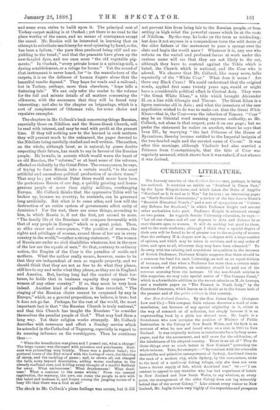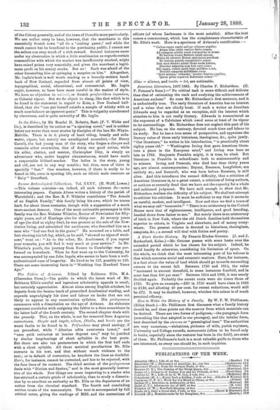Our New Zealand Cousins. By the Hon. James Inglis. (Sampson
Low and Co.)—This compact little volume deserves a word of com- mendation, not because of any special originality in it, either in the way of research or of reflection, but simply because it is an unpretending book by a plain but shrewd man. Mr. Ioglis is a Scotchman who now occupies the position of Minister of Public Instruction in the Colony of New South Wales, and his book is an account of what he saw and heard when on a visit in 1885 to New Zealand. It was originally written in instalments for a Sydney news- paper, and for the amusement, and still more for the edification, of the inhabitants of his adopted country. There is an air of" They do these things ever so much better in New Zealand" pervading the whole volume. Take, for example :—" By contrast with the miserable makeshifts and primitive arrangements of Sydney, Auckland rises to the rank of a modern city, while Sydney, by the comparison, sinks to the level of a mediaaval fishing village, only she does not even have a decent supply of fish, which Auckland has." Or :—" I am content to appeal to any traveller who has had experience of hotels in New Zealand and New South Wales, to say whether, at every point, the management of the older Colony does not lag miserably behind that of the newer Colony." Like almost every visitor to New Zealand, Mr. Inglis thinks very highly of the capacities and prospects of the Colony generally, and of the town of Dunedin more particularly. We are rather sorry to hear, however, that the merchants in this essentially Scotch town "all do a cutting game ;' and while the result cannot but be beneficial to the purchasing public, I cannot see the sellers can reap much of a rich reward. Several instances came under my observation in which a little combination as regards certain commodities with which the market was insufficiently stocked, might have raised prices very materially, and given the merchant a legiti- mate profit on his scanty stocks. But no ! Each was afraid of the other forestalling him or springing a surprise on him." Altogether, Mr. Inglis's book is well worth reading as a breezily-written hand- book of New Zealand, regarded from almost all points of view, topographical, social, educational, and commercial. Mr. Inglis ought, however, to have been more careful in the matter of style. We have no objection to naiveté, or Scotch prtefervidum ingenium, or Colonial vigour. But we do object to slang, like that which is to be found in the statement in regard to Kato, a New Zealand half- blood, that she "can put herself outside a sample of whisky with as much nonchalance as apparent gusto." This is vulgarity unredeemed by cleverness, and is quite unworthy of Mr. Inglis.



















































 Previous page
Previous page